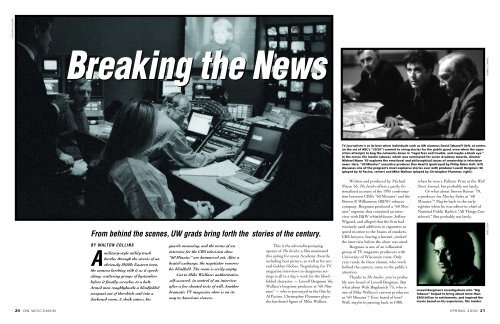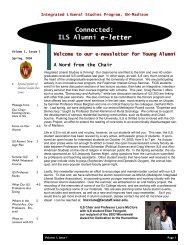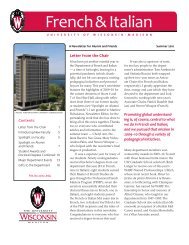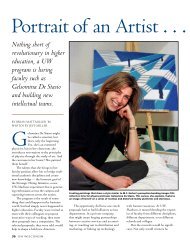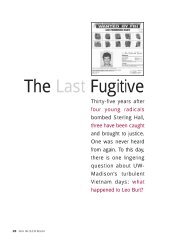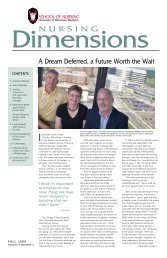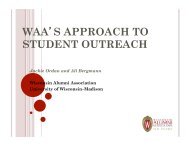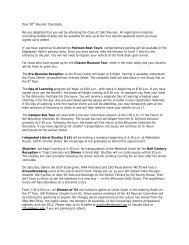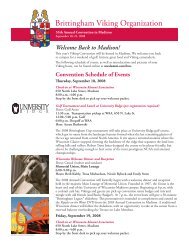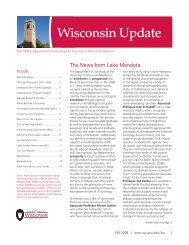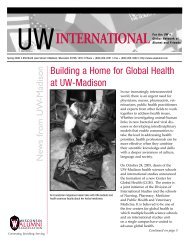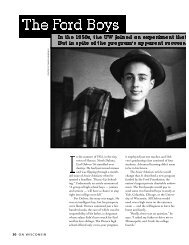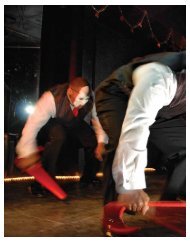Breaking the News - Wisconsin Alumni Association
Breaking the News - Wisconsin Alumni Association
Breaking the News - Wisconsin Alumni Association
Create successful ePaper yourself
Turn your PDF publications into a flip-book with our unique Google optimized e-Paper software.
CAROLINA SALGUERO<br />
<strong>Breaking</strong> <strong>the</strong> <strong>News</strong><br />
FRANK O'CONNOR<br />
TV journalism is at its best when individuals such as UW alumnus David Tabacoff (left, at center,<br />
on <strong>the</strong> set of ABC’s “20/20”) commit to airing stories for <strong>the</strong> public good, even when <strong>the</strong> opposition<br />
attempts to bog <strong>the</strong> networks down in “legal fees and trouble, and maybe a black eye.”<br />
In <strong>the</strong> movie The Insider (above), which was nominated for seven Academy Awards, director<br />
Michael Mann ’65 explores <strong>the</strong> emotional and philosophical issues of censorship in television<br />
news. Here, “60 Minutes” executive producer Don Hewitt (portrayed by Philip Baker Hall, left)<br />
discusses one of <strong>the</strong> program’s most explosive stories ever with producer Lowell Bergman ’66<br />
(played by Al Pacino, center) and Mike Wallace (played by Christopher Plummer, right).<br />
From behind <strong>the</strong> scenes, UW grads bring forth <strong>the</strong> stories of <strong>the</strong> century.<br />
BY WALTON COLLINS<br />
Amilitary-style utility truck<br />
hurtles through <strong>the</strong> streets of an<br />
obviously Middle Eastern town,<br />
<strong>the</strong> camera lurching with it as it speeds<br />
along, scattering groups of bystanders<br />
before it finally screeches to a halt.<br />
Armed men roughlyhustle a blindfolded<br />
occupant out of <strong>the</strong>vehicle and into a<br />
darkened room. A sheik enters, his<br />
guards menacing, and <strong>the</strong> terms of an<br />
interview for <strong>the</strong> CBS television show<br />
“60 Minutes” are hammered out. After a<br />
heated exchange, <strong>the</strong> negotiator removes<br />
his blindfold. The room is eerily empty.<br />
Cut to Mike Wallace: authoritative,<br />
self-assured, in control of an interview<br />
after a few shouted tests of will. Ano<strong>the</strong>r<br />
dramatic TV magazine show is on its<br />
way to American viewers.<br />
This is <strong>the</strong> adrenalin-pumping<br />
opener of The Insider, a film nominated<br />
this spring for seven Academy Awards,<br />
including best picture, as well as for several<br />
Golden Globes. Negotiating for TV<br />
magazine interviews in dangerous settings<br />
is all in a day’s work for <strong>the</strong> blindfolded<br />
character — Lowell Bergman ’66,<br />
Wallace’s longtime producer at “60 Minutes”<br />
— who is portrayed in <strong>the</strong> film by<br />
Al Pacino. Christopher Plummer plays<br />
<strong>the</strong> hardened figure of Mike Wallace.<br />
Written and produced by Michael<br />
Mann ’65, The Insider offers a partly fictionalized<br />
account of <strong>the</strong> 1995 confrontation<br />
between CBS’s “60 Minutes” and <strong>the</strong><br />
Brown & Williamson (B&W) tobacco<br />
company. Bergman produced a “60 Minutes”<br />
segment that contained an interview<br />
with B&W whistleblower Jeffrey<br />
Wigand, and alleged that <strong>the</strong> firm had<br />
routinely used additives in cigarettes to<br />
speed nicotine to <strong>the</strong> brains of smokers.<br />
CBS lawyers, fearing a lawsuit, yanked<br />
<strong>the</strong> interview before <strong>the</strong> show was aired.<br />
Bergman is one of an influential<br />
group of TV magazine producers with<br />
University of <strong>Wisconsin</strong> roots. Only<br />
very rarely do <strong>the</strong>se alumni, who work<br />
behind <strong>the</strong> camera, come to <strong>the</strong> public’s<br />
attention.<br />
Thanks to The Insider, you’ve probably<br />
now heard of Lowell Bergman. But<br />
what about Walt Bogdanich ’75, who is<br />
one of Mike Wallace’s current producers<br />
at “60 Minutes”? Ever heard of him?<br />
Well, maybe in passing back in 1988,<br />
when he won a Pulitzer Prize at <strong>the</strong> Wall<br />
Street Journal, but probably not lately.<br />
Or what about Steven Reiner ’70,<br />
a producer for Morley Safer at “60<br />
Minutes”? Maybe back in <strong>the</strong> early<br />
eighties when he was editor-in-chief of<br />
National Public Radio’s “All Things Considered.”<br />
But probably not lately.<br />
Lowell Bergman’s investigations into “Big<br />
Tobacco” helped to bring about more than<br />
$360 billion in settlements, and inspired <strong>the</strong><br />
movie based on his experience, The Insider.<br />
NIGEL PARRY<br />
20 ON WISCONSIN<br />
SPRING 2000 21
CAROLINA SALGUERO (3)<br />
Steven Reiner, a former Daily Cardinal<br />
editor, says he’s “been trying to recreate<br />
that sense of intensity, that sense of involvement”<br />
in his current work in TV journalism.<br />
As a producer for CBS’s Morley Safer, he<br />
specializes in culture, trends, and ideas.<br />
And how about David Tabacoff ’71,<br />
senior broadcast producer for “20/20”<br />
over at ABC? Or Glenn Silber ’72,<br />
ano<strong>the</strong>r “20/20” producer whose work<br />
has enlivened newsmagazine shows for<br />
thirteen years?<br />
These names don’t begin to exhaust<br />
<strong>the</strong> roster of <strong>Wisconsin</strong> graduates in key<br />
positions in <strong>the</strong> TV news industry. But<br />
what <strong>the</strong>se particular alumni have in<br />
common are degrees earned during <strong>the</strong><br />
heady, icon-smashing era of <strong>the</strong> sixties<br />
and seventies, and <strong>the</strong> unusual routes<br />
<strong>the</strong>y took into TV journalism.<br />
Case in Point<br />
Some of <strong>the</strong>se producers share with<br />
Bergman a history of involvement with<br />
<strong>the</strong> long-running “Big Tobacco” saga that<br />
has led to multiple state lawsuits against<br />
tobacco firms and a settlement that<br />
exceeds $360 billion. Bogdanich is one<br />
of <strong>the</strong>se. In <strong>the</strong> late eighties, fresh from<br />
exposing faulty testing in unregulated<br />
medical laboratories, he went to work for<br />
ABC’s newsmagazine “Day One” and<br />
started investigating nicotine, learning<br />
as much as he could about its effects on<br />
health. As summarized in a 1995 article<br />
in <strong>the</strong> Columbia Journalism Review, he<br />
concluded that <strong>the</strong> tobacco industry had<br />
both <strong>the</strong> intent and <strong>the</strong> ability “to manipulate<br />
and control <strong>the</strong> nicotine content of<br />
cigarettes to satisfy . . . consumer demand<br />
for nicotine.”<br />
Braced by an FDA statement pointing<br />
to <strong>the</strong> same conclusion, “Day One”<br />
aired a show that had far-reaching<br />
results: Congressional hearings into<br />
<strong>the</strong> tobacco industry, <strong>the</strong> nationally<br />
acclaimed George Polk Award for journalism,<br />
and a $10 billion lawsuit against<br />
ABC from Philip Morris — <strong>the</strong> biggest<br />
in history. The suit singled out Bogdanich<br />
as one of <strong>the</strong> defendants.<br />
Ultimately, ABC apologized — but<br />
for only a small part of <strong>the</strong> broadcast. It<br />
continued to stand behind <strong>the</strong> “Day One”<br />
story’s main allegations of nicotine<br />
manipulation, yet it paid Philip Morris’s<br />
legal fees. What Bogdanich saw as a<br />
cave-in angered him — and still does. “I<br />
naively thought truth was <strong>the</strong> defense,”<br />
he told On <strong>Wisconsin</strong> recently. “The problem<br />
was, ABC was being merged with<br />
Disney, and <strong>the</strong>y just didn’t want to have<br />
to mess with this. Our<br />
lawyers were totally<br />
confident of victory —<br />
we were not going to<br />
lose this case, no way,<br />
nohow — but our vindication<br />
was not going to<br />
happen in time for <strong>the</strong><br />
merger. I never got my<br />
day in court, despite<br />
<strong>the</strong> fact that <strong>the</strong>y kept<br />
promising me I’d<br />
get one.”<br />
That led to Bogdanich’s<br />
decision to<br />
move to CBS, although<br />
he didn’t bolt immediately.<br />
“I hung around a<br />
little bit longer and<br />
worked on ano<strong>the</strong>r<br />
tobacco story, just to<br />
kind of show <strong>the</strong> world<br />
that <strong>the</strong>y couldn’t defeat<br />
me. That way I left on<br />
my own terms. ABC<br />
tried mightily to keep<br />
me, which I found flattering<br />
and [saw as] <strong>the</strong><br />
clearest indication that I had done<br />
absolutely nothing wrong and was right<br />
on <strong>the</strong> money.”<br />
Although Bogdanich says he harbors<br />
no bitterness — “I had great years over<br />
<strong>the</strong>re” — he thinks that <strong>the</strong> management<br />
of ABC <strong>News</strong> “has no backbone when it<br />
comes to standing for <strong>the</strong> truth and fighting<br />
for it. Those aren’t <strong>the</strong> folks who<br />
should be running a news division.”<br />
Counterpoint<br />
As senior broadcast producer at ABC,<br />
David Tabacoff has, understandably, a<br />
different view. He’s in charge of three<br />
weekly broadcasts and a staff of two<br />
hundred, and credits Bogdanich as <strong>the</strong><br />
“key person” in breaking open <strong>the</strong> “Big<br />
Tobacco” story, saying that “he really<br />
did <strong>the</strong> amazing work in that area. In<br />
The Insider, <strong>the</strong>y premise it on Jeffrey<br />
Wigand’s discovering that nicotine was a<br />
delivery system, but that was really Walt’s<br />
reporting at ABC.” But he demurs at <strong>the</strong><br />
suggestion that ABC <strong>News</strong> runs scared.<br />
“I’ve never found, inside <strong>the</strong> company,<br />
any sense of, ‘Don’t do this story<br />
because company X is an advertiser,’ ” he<br />
says. “The real challenge is that people<br />
outside watch what you do very carefully<br />
— this is <strong>the</strong> major league — and when<br />
you do a story on company X, you have<br />
to be accurate and fair, and <strong>the</strong>re’s not<br />
much room for error in terms of how we<br />
approach a story. Over <strong>the</strong> last couple<br />
of years we’ve done risky stories — for<br />
example, involving cell phones and issues<br />
of <strong>the</strong> safety of plastics in baby toys — so<br />
I think we’ve taken on all sorts of issues.<br />
“And we had a big victory with<br />
‘PrimeTime Live’ and <strong>the</strong> Food Lion<br />
story,” he points out, referring to a suit<br />
brought against ABC by <strong>the</strong> Food Lion<br />
supermarket chain after two “PrimeTime<br />
Live” producers got jobs at <strong>the</strong> chain and<br />
used hidden cameras and microphones in<br />
an effort to show that supermarket<br />
employees repackaged and re-dated fish<br />
and meat after <strong>the</strong>ir expiration dates. The<br />
suit alleged trespass and fraud, not libel,<br />
a tactic that sent a shiver through <strong>the</strong><br />
news media. A 1996 jury finding in favor<br />
of Food Lion, however, was modified on<br />
appeal, and a huge damage award was<br />
dismissed.<br />
“Food Lion came at us from a<br />
fraud angle,” Tabacoff notes, “but in<br />
<strong>the</strong> end we beat that back. That’s<br />
critical, because if you go around<br />
[<strong>the</strong> First Amendment] and try to<br />
get at us through odd laws, that’s<br />
dangerous. But I think <strong>the</strong> courts<br />
have recognized that it was basically<br />
a First Amendment case, no matter<br />
what you call it.”<br />
Accountability<br />
Is <strong>the</strong> Issue<br />
The <strong>Wisconsin</strong> alumni in TV journalism<br />
have tackled topics ranging far beyond<br />
food and fraud and tobacco. Glenn Silber<br />
at ABC, for example, has covered a wide<br />
variety of challenging stories, both before<br />
and since joining “20/20.” A national<br />
panel of media executives and journalists<br />
selected him for <strong>the</strong> prestigious George<br />
Polk Award in 1991 for a program he<br />
produced with <strong>the</strong> Center for Investigative<br />
Reporting for <strong>the</strong> PBS show “Frontline.”<br />
Called “The Great American<br />
Bailout,” it dealt with <strong>the</strong> savings and<br />
loan collapse in <strong>the</strong> late eighties and <strong>the</strong><br />
subsequent federal rescue of that industry,<br />
a rescue whose price tag was recently<br />
put at $140 billion by Representative<br />
James Leach (R-Iowa), chair of <strong>the</strong><br />
House Committee on Banking.<br />
At “20/20,” Silber is especially proud<br />
of his stories that have championed<br />
ordinary people who find <strong>the</strong>mselves<br />
wronged by powerful segments of society,<br />
stories that are united, he says, “by <strong>the</strong><br />
issue of accountability.” One was about<br />
When Walt Bogdanich (left) was with ABC,<br />
he was <strong>the</strong> first to break <strong>the</strong> news on how<br />
<strong>the</strong> tobacco industry had <strong>the</strong> intent and<br />
<strong>the</strong> ability “to manipulate and control <strong>the</strong><br />
nicotine content of cigarettes” to satisfy consumer<br />
demand. The story caught on like<br />
wildfire, but it led to a network apology and<br />
to what Bogdanich saw as an ABC cave-in to<br />
“Big Tobacco.” Now a producer for Mike<br />
Wallace (right) at CBS, he says he’s “still in it<br />
after all of <strong>the</strong>se years” because he has <strong>the</strong><br />
potential to make a difference.<br />
“I don’t see myself<br />
as any kind of big<br />
‘investigative<br />
reporter,’ “ says<br />
“20/20’s” Glenn<br />
Silber, “but I often<br />
gravitate toward<br />
stories where <strong>the</strong>re<br />
has been some kind<br />
of injustice” — be<br />
it asbestos contamination,<br />
<strong>the</strong> collapse<br />
of S&Ls, or<br />
<strong>the</strong> death of an<br />
inmate.<br />
Icon of an Era<br />
In 1979, when he was an independent<br />
producer, Glenn Silber ’72<br />
came within an eyelash of receiving<br />
an Academy Award for a documentary<br />
film he<br />
produced and<br />
directed with<br />
Barry Alexander<br />
Brown<br />
titled The War<br />
at Home. The<br />
film looks at<br />
<strong>the</strong> upheavals<br />
in Madison that<br />
swirled around<br />
<strong>the</strong> civil rights<br />
and anti-Vietnam<br />
movements<br />
of <strong>the</strong><br />
sixties and<br />
seventies. Dramatic<br />
archival<br />
footage of<br />
sit-ins,<br />
marches, and<br />
police confrontations<br />
is<br />
woven through<br />
interviews with<br />
students, community<br />
leaders, Vietnam veterans,<br />
and o<strong>the</strong>rs who lived through those<br />
years.<br />
The film missed out to Best Boy<br />
for <strong>the</strong> Oscar in <strong>the</strong> documentary<br />
features category, but it was a blue<br />
ribbon winner in <strong>the</strong><br />
1980 American Film<br />
Festival, and won <strong>the</strong><br />
best documentary<br />
award at <strong>the</strong> U.S.<br />
Film Festival <strong>the</strong><br />
same year.<br />
Videotapes<br />
of The War at<br />
Home are available<br />
from First<br />
Run Features,<br />
153 Waverly<br />
Place, New York, NY 10014,<br />
(800) 229-8575. The Web site is<br />
www.firstrunfeatures.com.<br />
22 ON WISCONSIN<br />
SPRING 2000 23
<strong>the</strong> alleged cover-up of a prisoner<br />
killed by guards in <strong>the</strong> Maricopa<br />
County, Arizona, jail. The dramatic<br />
video footage included grainy<br />
security camera shots of <strong>the</strong> brutal<br />
beating of a nearly comatose prisoner.<br />
The cover-up, which started<br />
with <strong>the</strong> sheriff and reached into<br />
<strong>the</strong> medical examiner’s office,<br />
included destroyed evidence of<br />
what looked to Silber like a taxpayer-subsidized<br />
homicide.<br />
He also did groundbreaking<br />
reporting about people who<br />
have been misdiagnosed with<br />
melanoma. “When you do a story<br />
like that, you can hopefully raise<br />
awareness of a problem and actually<br />
might save some people’s<br />
lives,” he says with satisfaction.<br />
And early this year, he wrapped up<br />
a story that took him to Libby,<br />
Montana, where a vermiculite<br />
mine operated by W. R. Grace has<br />
exposed several hundred workers<br />
and <strong>the</strong>ir families to asbestos contamination,<br />
and has reportedly<br />
led to two hundred deaths over<br />
half a century. These kinds of stories<br />
appeal to him, he says,<br />
because <strong>the</strong>y “offer <strong>the</strong> chance to<br />
wake people up. I don’t see<br />
myself as any kind of big ‘investigative<br />
reporter,’ but I often gravitate toward<br />
stories where <strong>the</strong>re has been some kind<br />
of injustice.”<br />
What <strong>the</strong>se alumni share — along<br />
with o<strong>the</strong>rs such as Mike Radutsky ’78 at<br />
“60 Minutes” — is a conviction that <strong>the</strong>y<br />
were fortunate to attend <strong>Wisconsin</strong> at a<br />
unique moment in <strong>the</strong> country’s history:<br />
<strong>the</strong> protest years and attendant sea<br />
change in Americans’ attitudes toward<br />
government and authority in general. But<br />
this is not <strong>the</strong> story of a bunch of campus<br />
radicals who packed up <strong>the</strong>ir crusades<br />
and trotted off to media careers after<br />
graduation. Some were politically active<br />
in college; some were not. Some were<br />
student journalists; most were not. How<br />
<strong>the</strong>y got to where <strong>the</strong>y are now is almost<br />
more interesting than <strong>the</strong> fact that <strong>the</strong>y<br />
got <strong>the</strong>re in <strong>the</strong> first place.<br />
CAROLINA SALGUERO<br />
Earning degrees at <strong>the</strong> UW during <strong>the</strong> icon-smashing era of <strong>the</strong><br />
sixties and seventies has given <strong>Wisconsin</strong> grads an edge in <strong>the</strong><br />
TV news industry. Says Steven Reiner of CBS: “At Madison in<br />
those days, you had a sense of journalism being <strong>the</strong> route<br />
through which you could be involved in what was happening.”<br />
Walt Bogdanich certainly never<br />
expected to carve out a distinguished<br />
career for himself in <strong>the</strong> media. The son<br />
of a Gary, Indiana, steelworker and a<br />
self-named “screw-off in high school,”<br />
his talents were more compelling on <strong>the</strong><br />
pitching mound than in <strong>the</strong> classroom.<br />
Bogdanich had already been turned<br />
down by <strong>the</strong> university when his bro<strong>the</strong>r,<br />
George Bogdanich ’70, showed Walt’s<br />
baseball clips to Coach Dynie Mansfield.<br />
“He just called up admissions and said,<br />
‘Add one more,’ ” laughs Bogdanich.<br />
His appetite for journalism came<br />
about almost by accident. “I was going<br />
to an anti-war conference in Ohio,” he<br />
recalls, “and I had no money to get <strong>the</strong>re.<br />
My bro<strong>the</strong>r, who was working on <strong>the</strong><br />
Daily Cardinal, said, ‘Why don’t you propose<br />
to do a story for <strong>the</strong>m, and <strong>the</strong>y’ll<br />
pay your way?’ And that’s how I became<br />
a journalist. I started working for <strong>the</strong><br />
Cardinal and just fell in love with it.”<br />
Several newspaper jobs and a<br />
Pulitzer followed before Bogdanich<br />
moved from print to electronic<br />
journalism, first at ABC,<br />
<strong>the</strong>n<br />
at CBS.<br />
For David Tabacoff, <strong>the</strong> road<br />
to “20/20” led from Madison to<br />
a Fulbright scholarship in New<br />
Zealand, an Eagleton fellowship<br />
at Rutgers, a job at Consumer<br />
Reports magazine, a stint as a<br />
temporary researcher with ABC<br />
for <strong>the</strong> 1976 elections, and <strong>the</strong>n<br />
to a series of positions at ABC’s<br />
“World <strong>News</strong> Tonight” and<br />
“Nightline.”<br />
A political science major at<br />
Madison with a master’s degree<br />
from Rutgers, Tabacoff admits he<br />
was “always in politics and that<br />
sort of thing,” and he credits at<br />
least part of that interest to his<br />
time in Madison. “Those very<br />
turbulent years were a real eyeopener<br />
for people,” he says. “Suddenly<br />
you were thrust into this<br />
politically charged, but also intellectually<br />
interesting, environment.<br />
It really reinforced interests I had<br />
in terms of politics and news and<br />
history.” After reaching ABC,<br />
Tabacoff earned a night-school law<br />
degree at Fordham, and he even left <strong>the</strong><br />
network for a year to get a taste of practicing<br />
law. “But I came running back,” he<br />
adds quickly.<br />
For fellow “20/20” producer Glenn<br />
Silber, film was what he found riveting as<br />
an undergraduate. “Madison was a great<br />
place to learn about film history,” he says.<br />
“The campus was almost littered with<br />
film societies. On any weekend you could<br />
go to a lecture hall and see Citizen Kane or<br />
some new Truffaut movie, or some neorealism<br />
film by Fellini or Rossellini.”<br />
After graduation, he spent several<br />
years as an independent film producer in<br />
Madison and Los Angeles. He reached<br />
ABC by way of CBS, and still appears a<br />
little surprised to be working for a news<br />
organization. “Madison supported <strong>the</strong><br />
opportunity to dream a little, to pursue a<br />
Continued on page 54<br />
One day not long ago, Lowell<br />
Bergman ’66 was checking<br />
in at an airline counter when a<br />
stranger reacted to his name. The man<br />
turned out to be a fan of The Insider —<br />
<strong>the</strong> film nominated seven times for<br />
Oscars in 2000 — in which Bergman is<br />
portrayed by Al Pacino.<br />
“He said he’d seen <strong>the</strong><br />
movie three times,”<br />
Bergman says. “He<br />
asked for my<br />
autograph.”<br />
For people in<br />
television who aren’t<br />
in front of <strong>the</strong> camera,<br />
such encounters<br />
are rare. Even for<br />
Bergman, <strong>the</strong> incident<br />
was unusual enough to<br />
be amusing. “I don’t<br />
have <strong>the</strong> celebrity<br />
newsperson problem,”<br />
he says. “I’m not Al<br />
Pacino, so people who<br />
saw <strong>the</strong> film don’t recognize<br />
me. And <strong>the</strong>re isn’t<br />
a lot of recognition of<br />
my name.”<br />
But The Insider did turn Bergman’s<br />
visibility up a few notches. “Since<br />
<strong>the</strong> movie, more people call me to do<br />
things, to give talks and <strong>the</strong> like,”<br />
he says.<br />
Filmgoers were left with some<br />
uncertainty about Bergman’s future at<br />
<strong>the</strong> end of The Insider. Here’s what happened<br />
next: “In <strong>the</strong> spring of 1996,”<br />
says Bergman, “I began negotiations<br />
with CBS management to take me<br />
out of <strong>the</strong> chain of command at ‘60<br />
Minutes’ — after fourteen years with<br />
<strong>the</strong> show. That turned me into a sort<br />
of fulltime freelance person for CBS<br />
<strong>News</strong>, and I did a lot of stories for <strong>the</strong><br />
‘Evening <strong>News</strong>.’ It also freed up <strong>the</strong><br />
time to make <strong>the</strong> movie, which I did<br />
with CBS’s permission.”<br />
Bergman left CBS at <strong>the</strong> beginning<br />
of 1999, when his contract<br />
expired. He is now associated with <strong>the</strong><br />
Graduate School of Journalism at <strong>the</strong><br />
The Real Insider<br />
University of California-Berkeley as a<br />
teaching fellow and producer for<br />
“Frontline/West,” a joint venture of<br />
“Frontline” and <strong>the</strong> Berkeley journalism<br />
school. His current project is a documentary<br />
history of <strong>the</strong> war on drugs<br />
scheduled to air next September.<br />
Long before CBS and “Big Tobacco,” Lowell<br />
Bergman (above) took on important issues.<br />
At <strong>the</strong> UW, he was co-chair of <strong>the</strong> Committee<br />
to End <strong>the</strong> War, and was active at<br />
UC–San Diego (top, at top right, in 1966–67)<br />
as well. He’s now a teaching fellow and<br />
producer at UC–Berkeley.<br />
Although The Insider took dramatic<br />
liberties with <strong>the</strong> events it portrayed<br />
(“My wife says she’s not blonde and<br />
not taller than me,” he quips), Bergman<br />
believes it’s an important film “because<br />
it deals with issues you cannot deal<br />
with on network television news —<br />
issues of censorship and self-censorship.<br />
The film deals honestly with <strong>the</strong><br />
emotional and philosophical underpinnings<br />
of what was going on. I consider<br />
it an accomplishment to make a movie<br />
without car crashes or gratuitous sex<br />
that still can keep people in <strong>the</strong>ir seats.<br />
“The reason I got involved in <strong>the</strong><br />
movie project,” he adds, “was because I<br />
NIGEL PARRY<br />
felt strongly that management at CBS<br />
didn’t understand <strong>the</strong> implications of its<br />
own behavior. It is important that people<br />
understand that <strong>the</strong> management at<br />
‘60 Minutes’ went along with what<br />
happened. Even Mike Wallace<br />
wavered initially, going along with <strong>the</strong><br />
company decision<br />
before publicly protesting<br />
it. They did not put<br />
[<strong>the</strong> Wigand interview]<br />
on <strong>the</strong> air until after<br />
every important fact<br />
was published in <strong>the</strong><br />
Wall Street Journal. The<br />
media know no limits in<br />
reporting on political or<br />
entertainment people,<br />
but <strong>the</strong>re are stringent<br />
limits when <strong>the</strong>y report<br />
on Fortune 500 companies<br />
or someone of great<br />
wealth and power.”<br />
As do many o<strong>the</strong>r<br />
<strong>Wisconsin</strong> alumni in<br />
television careers,<br />
Bergman credits his<br />
undergraduate experience<br />
in Madison as crucial<br />
to what came afterward. A history<br />
and sociology major, he was heavily<br />
involved in <strong>the</strong> civil rights and Vietnam<br />
issues of his era at <strong>Wisconsin</strong>, including<br />
<strong>the</strong> administration building sit-in of<br />
May 1966. And as with o<strong>the</strong>rs from<br />
that time, that involvement whetted his<br />
appetite for being at, or near, <strong>the</strong> center<br />
of <strong>the</strong> important issues of <strong>the</strong> day.<br />
“Madison,” reflects Bergman now,<br />
“gave me an intellectual understanding<br />
of history.” The Insider will give millions<br />
more <strong>the</strong> chance to see something of<br />
what he’s learned.<br />
— W.C.<br />
SAN DIEGO HISTORICAL SOCIETY<br />
24 ON WISCONSIN<br />
SPRING 2000 25


